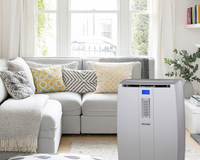How do you choose the right air conditioner for your home? In North America, there are four main types: portable air conditioners, window or wall mounted air conditioners, ductless split system air conditioners, and central (ducted) air conditioners. This guide describes the different styles of air conditioners to help you decide which style is right for you.
Portable Air Conditioners
If you live in a modern high-rise condo or apartment building, you probably have large floor-to-ceiling windows. While these windows offer great views, they also let in sunlight and heat, which can be overwhelming in the warmer months. Since most condos are under strata ownership, you may be subject to rules preventing you from altering the exterior of your unit. In this situation, a portable air conditioner is a perfect solution for your needs.
Regardless of what type of building you live in, a portable air conditioner provides the same powerful cooling as a permanent air conditioner without the trouble of installing one. This type of air conditioner may also be a great choice for customers who wish to set up and begin using an air conditioner immediately since it only takes a few minutes to set up.
The following are a few factors to consider if you are thinking of purchasing a portable air conditioner:
1. Brand Name
An air conditioner is a major purchase for most people, that serves an important function in a home. Therefore, you should feel confident that your unit will work properly when you need it to. Brands like DeLonghi and Toyotomi—who started manufacturing in Italy in 1986 and in Japan in 1992 respectively—are pioneers in the portable air conditioning industry and consistently produce quality machines. Today, both brands manufacture their air conditioners in China. Unlike other brands, however, DeLonghi and Toyotomi manage their own factories to maintain their quality control. Many smaller and less established brands source factories that already manufacture air conditioners and just add their brand name on them.
2. Cooling Capacity
The heating and cooling capacity of air conditioners are measured in BTU/h, which stands for British Thermal Unit per Hour. Consult the chart below to identify which BTU/h capacity you require for your room size. Besides the size of your room, other factors to consider when choosing an air conditioner include the direction of the windows in your room, the height of your ceilings, and what your room is used for. For example, a room used as an office for several people, computers, and other electronics which all produce heat, will require a higher BTU/h air conditioner than a bedroom for two people. Because the effectiveness of an air conditioner depends on multiple variables, the chart below provides a size range for each BTU/h rating.

3. Single Hose vs Dual Hose
On the back of every single hose portable air conditioner is an exhaust hose which must be stretched out to a window. You will also notice an air intake on the side of the air conditioner. Through this intake, single hose air conditioners use internal power to separate existing hot air and cool air in your room. The exhaust hose extracts and transfers hot air from the air intake to the outside world while creating and recirculating cool air inside your room.
Dual hose portable air conditioners are newer models that have two flexible hoses at the rear of the machine, both of which must be stretched out to a window. Unlike single hose units, the additional hose brings in fresh air from outside to cool down the air conditioner’s internal compressor, making them more efficient. This outside air is not blown into your room. Because two hoses must be stretched out to a window, dual hose machines are marginally more inconvenient to install.
4. Drainage
Hot weather often causes humidity, creating a stuffy room that is hard to breathe in. In contrast to other types of air conditioning, portable air conditioners are set up completely inside your home and therefore require unique methods to remove humidity.
Some models have a drain tank that must be emptied regularly. An air conditioner will signal a full drain tank by automatically shutting off. Depending on how humid it is, you may have to empty your tank several times a day. Newer models, however, are usually self-evaporating, expelling the humidity it collects through the exhaust hose so you don't have to worry about emptying the drain tank.
5. Functions
Besides cooling air, portable air conditioners have a few additional features. They also function as dehumidifiers, air cleaners, and fans for circulation.
6. Warranty
The most important and expensive part of an air conditioner is the compressor, whose role is to circulate the coolant within the machine. Most major brands provide a 3-year warranty on the compressor and the sealed coolant system. The rest of the air conditioner is typically covered by a limited 1-year warranty.
At Forum Appliances, we stock a variety of portable air conditioners to ensure you can find one that is best for you. Browse our models here.
Window/Wall Mounted Air Conditioners
For older apartments and houses, many customers choose to install a window or a wall-mounted air conditioner. These are the traditional, square, box-style air conditioners that you may have seen hanging part-way out of older buildings’ windows. They are the least expensive type of air conditioner and also the easiest to install, as models come with a kit that allows for different window widths. While many customers install window/wall mounted air conditioners on their own, you may also wish to have yours professionally installed. An air conditioning contractor or glass contractor can help you fit your window to your air conditioner to avoid the unattractive look from a self-installation using a window kit.
NOTE: This kit is designed for windows that open vertically (up to down), so this kit will not be compatible with windows that open horizontally (side to side).
Ductless Split System Air Conditioners
If you use a radiant heating system or an electric baseboard heating system, a split system air conditioner may be the way to go. This type of air conditioner has a fan unit on the inside of your room and a separate compressor unit on the outside of your house. The two units are connected with copper pipes that exchange the coolant, and an electrical wire for power. A three-inch hole must be drilled behind the inside unit to allow for the attachment of these pipes and wires. Since the compressor—the noisy part of the air conditioner—is located outside your room, split system air conditioners are much quieter than other forms of air conditioners. This type of air conditioner must be installed by a licenced technician.
NOTE: If you are considering installing a split system air conditioner in a condominium or strata townhome complex, please check with your building manager or strata corporation. Most newer buildings (less than 15 years old) are covered by an insurance policy against leaks in the building, known as a Building Envelope Warranty. With this warranty, the exterior walls (known as the "envelope" of the building) may not be punctured in any way, or the warranty for the entire building may be voided. In order to install a split system air conditioner, your contractor must drill a hole (approximately 3 inches in diameter) through your exterior wall to connect the outside unit with the inside unit. This would mean puncturing the envelope. As the homeowner, you would be liable for this unless you have written permission from your strata corporation or the building owner (if it is not strata).
Central Air Conditioners
If you have a forced-air heating system, another option for you is the central air conditioner. These systems utilize the existing air ducts installed for your heating system to distribute cool air to all of the rooms in your house at once. This type of system is more cost-effective to install for homes with forced-air heating, but may be tricky if you are using other systems such as electric baseboard or radiant hot water heating. This type of air conditioner must be professionally installed by a licenced technician.
NOTE: Central air conditioners will cool your entire house, even if you are only using a couple of rooms, so they will use a lot of energy.







